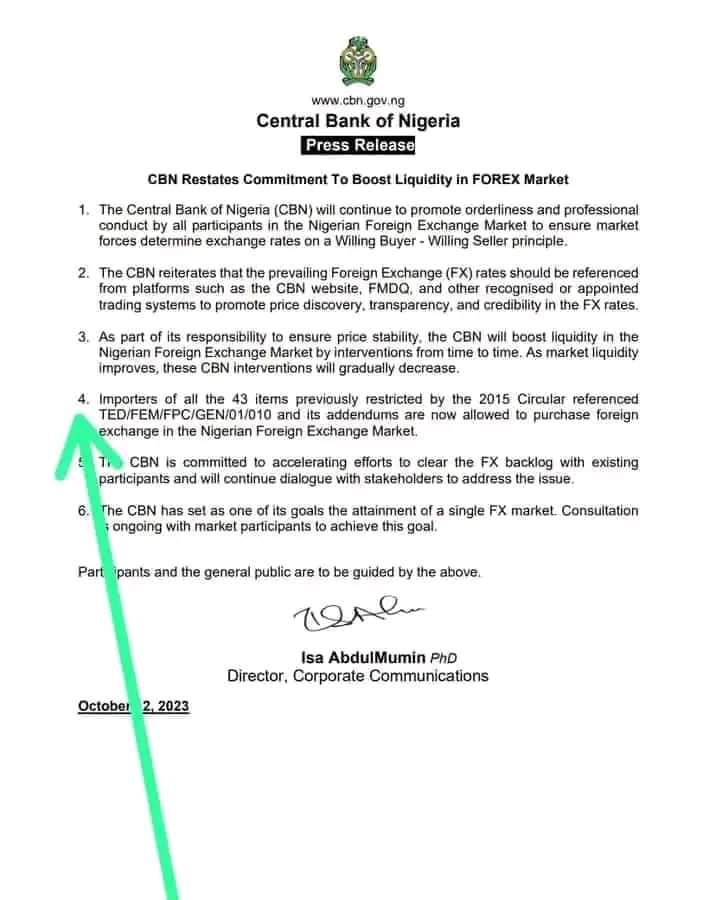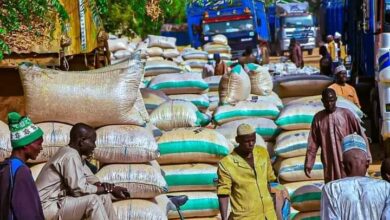Import Substitution – Boosting Local Production in Nigeria The Mechanics of Economic Growth.
Forging Progress: The Crucial Role of Industrial Development

Import Substitution – Boosting Local Production in Nigeria
Introduction: The Central Bank of Nigeria (CBN) has taken a giant stride in promoting self-reliance and strengthening the nation’s economy by implementing a policy aimed at restricting the importation of 43 essential items. These items encompass a wide range of food, construction materials, and industrial products. The move is not only a significant step towards reducing Nigeria’s reliance on foreign goods but also a means of accelerating local production and economic growth.

The Import Substitution Initiative:
The CBN’s import substitution initiative focuses on curtailing the importation of key products and encouraging Nigerians to turn to domestically produced alternatives. The goal is to bolster local industries, create jobs, and improve the overall economic landscape.
The List of Restricted Items:
The comprehensive list of items that have been restricted for import includes:
- Rice
- Cement
- Margarine
- Palm kernel
- Palm oil products
- Vegetable oils
- Meat and processed meat products
- Vegetables and processed vegetable products
- Poultry and processed poultry products
- Tinned fish in sauce (Geisha)/sardine
- Cold rolled steel sheets
- Galvanized steel sheets
- Roofing sheets
- Wheelbarrows
- Head pans
- Metal boxes and containers
- Enamelware
- Steel drums
- Steel pipes
- Wire rods (deformed and not deformed)
- Iron rods
- Reinforcing bars
- Wire mesh
- Steel nails
- Security and razor fencing and poles
- Wood particle boards and panels
- Wood fiberboards and panels
- Plywood boards and panels
- Wooden doors
- Toothpicks
- Glass and glassware
- Kitchen utensils
- Tableware
- Tiles-vitrified and ceramic
- Gas cylinders
- Woven fabrics
- Clothes
- Plastic and rubber products
- Polypropylene granules
- Cellophane wrappers and bags
- Soap and cosmetics
- Tomatoes/tomato pastes
- Eurobond/foreign currency bond/share purchases
The Potential Benefits:
- Economic Growth: The import substitution initiative can fuel economic growth by stimulating local production, job creation, and increased economic activities.
- Self-Reliance: Nigeria will reduce its reliance on foreign goods, leading to greater self-sufficiency and less vulnerability to international market fluctuations.
- Industrial Development: Local industries will flourish as demand for domestic alternatives grows, leading to technological advancements and innovations.
- Balance of Trade: The policy can help to balance Nigeria’s trade deficit by decreasing the need for foreign exchange to import these restricted items.
- Improved Quality Control: Domestic producers will be incentivized to improve the quality of their products to compete effectively with imports.

Unleashing Prosperity: The Mechanics of Economic Growth
Economic growth is more than just a buzzword; it’s the lifeblood of a nation’s prosperity and well-being. It’s the engine that powers job creation, raises living standards, and advances societies. In this blog post, we’ll explore the fascinating world of economic growth, understand its core concepts, and discuss the factors that drive it.
Understanding Economic Growth:
Economic growth refers to the sustained increase in a country’s production of goods and services over time. It is often measured by the Gross Domestic Product (GDP), which represents the total value of all goods and services produced within a nation’s borders. But economic growth isn’t just about generating more “stuff”; it’s about improving the quality of life for a country’s citizens.
The Engine of Economic Growth:
Several key drivers propel economic growth:
- Investment: Investment in capital, such as machinery, infrastructure, and technology, enhances a country’s productive capacity. This boosts efficiency and contributes to growth.
- Innovation: Technological advancements and innovation lead to improved products and processes. Innovation not only drives economic growth but also raises living standards.
- Education and Skills: A skilled workforce is more productive, adaptable, and capable of driving economic growth. Investment in education and training is an investment in the nation’s future.
- Infrastructure: Roads, bridges, airports, and other infrastructure projects reduce transportation costs and enable smoother trade and economic activity.
- Entrepreneurship: A vibrant entrepreneurial ecosystem encourages the creation of new businesses, which often become key drivers of economic growth.
- Trade: Global trade expands a nation’s market and creates opportunities for specialization, leading to increased productivity and growth.
The Role of Government:
Governments play a crucial role in fostering economic growth. They can influence growth through policies that promote stability, investment, and innovation. These policies might include tax incentives, regulatory reform, and support for research and development.
Measuring Success:
As mentioned earlier, GDP is a common measure of economic growth. However, it’s essential to remember that economic growth should ultimately translate into better living standards, reduced poverty, and enhanced well-being for the population.
Challenges and Considerations:
While economic growth is undeniably beneficial, it also presents challenges. Environmental concerns, income inequality, and social issues can arise if growth is not managed responsibly. Achieving sustainable and inclusive growth is a complex task that requires a balance between economic, social, and environmental factors.

Forging Progress: The Crucial Role of Industrial Development
Industrial development is the catalyst for economic progress and societal advancement. It’s the process of transitioning from agrarian and labor-intensive economies to ones that leverage advanced technology and manufacturing to drive growth. In this blog post, we will delve into the concept of industrial development, its significance, and the key factors that propel it forward.
Understanding Industrial Development:
Industrial development refers to the transformation of an economy, typically from one that relies heavily on agriculture and natural resources to one that emphasizes manufacturing, technology, and advanced production processes. This shift is characterized by an increase in the share of industrial sectors in the overall economy.
The Significance of Industrial Development:
Industrial development is more than just the growth of factories and manufacturing. It underpins several critical aspects of economic and social progress:
- Economic Growth: Industrialization enhances a nation’s productive capacity, leading to economic growth and higher GDP.
- Job Creation: The expansion of industrial sectors generates employment opportunities, reducing unemployment and poverty.
- Innovation: Industrial development fosters innovation and technological advancements, which drive productivity and competitiveness.
- Infrastructure Development: Industrialization often requires improvements in transportation, energy, and communication infrastructure, benefitting various sectors.
- Export Growth: Industrialized nations are better equipped to participate in global trade, leading to export growth and a stronger international presence.
Factors Driving Industrial Development:
Several key factors propel industrial development:
- Investment: Both public and private sector investments in manufacturing and technology are critical for industrial growth.
- Human Capital: A skilled and educated workforce is essential for operating modern industrial processes and driving innovation.
- Infrastructure: Adequate transportation, energy, and communication infrastructure is necessary to support industrial activities.
- Regulatory Environment: A business-friendly regulatory environment that promotes investment and entrepreneurship is crucial for industrial development.
- Access to Capital: Access to financing and capital markets is essential for business expansion and modernization.
Sustainable Industrial Development:
Sustainable industrial development is a growing concern. It emphasizes responsible resource management, energy efficiency, and the reduction of environmental impact. Sustainable practices ensure that industrialization benefits society without compromising future generations’ well-being.
Challenges and Considerations:
Industrial development also presents challenges, such as environmental degradation, social inequalities, and the displacement of traditional livelihoods. Governments and industries must navigate these issues responsibly while pursuing growth.
Industrial development is a dynamic and transformative force that powers economic progress and raises living standards. By fostering innovation, creating jobs, and driving technological advancements, industrialization holds the potential to bring prosperity and a better quality of life to societies around the world.
Conclusion:
The CBN’s import substitution initiative is a bold step towards strengthening the Nigerian economy and encouraging local production. By restricting the importation of 43 essential items, Nigeria is taking a significant stride towards self-sufficiency, economic growth, and the development of vibrant, competitive industries. As the policy takes hold, it is expected to contribute positively to the nation’s overall prosperity and resilience in the global economic landscape. We eagerly await the results of this transformative initiative and hope for a brighter future for Nigeria.







